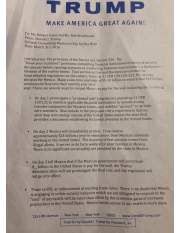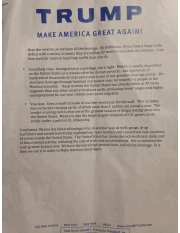Another day of CSS….Clinton Saturation Syndrome…
Abedin responded to Band request: ‘Ok will figure it out’
Emails also reveal Bill Clinton/Doug Band Sought State Department Favors for Foundation supporters Paul Liveris, Chris Ruddy, and Lynn de Rothschild
(Washington, DC) – Judicial Watch today released 510 pages of new State Department documents, including a 2009 request by Clinton Foundation executive Doug Band for diplomatic passports for himself and an associate. Former Secretary of State Hillary Clinton’s aide Abedin responded to Band’s request positively, saying, “Ok will figure it out.” The emails show Hillary Clinton forwarding classified information to Abedin’s unsecured, non-state.gov account. The emails also show Bill Clinton sought a meeting with Mrs. Clinton for a major Clinton donor with State Department officials and Hillary Clinton herself pushed for a joint event with the Clinton Global Initiative. Band also pushed for and obtained special help from Abedin for seven-figure Clinton Foundation donor Chris Ruddy, of Newsmax.com.
Although an exchange sent from Sidney Blumenthal to Hillary Clinton concerning the “disastrous nature of the Obama trip” and the U.S. being “totally out of the loop in Berlin – no ambassador” with the expectation that “Germans and Russians will now cut their own separate deals on energy, regional security, etc….” had previously published by the State Department, it was unknown until now that Clinton forwarded this exchange containing classified information that was redacted for security reasons to Abedin’s unsecure non-state.gov account
The new documents included 37 Hillary Clinton email exchanges not previously turned over to the State Department, bringing the known total to date of such emails uncovered by Judicial Watch to 228 of new Clinton emails (not part of the 55,000 pages of emails that Clinton turned over to the State Department). These records further appear to contradict statements by Clinton that, “as far as she knew,” all of her government emails were turned over to the State Department.
The Band request for a special diplomatic passport for himself and his associates – an unidentified “JD” and apparently Justin Cooper, formerly a key member of Bill Clinton’s personal office and the Clinton Foundation who has been linked to registration documents for and the shutting down of the email server at the center of Mrs. Clinton’s State Department emails controversy.
The Band-Abedin exchange went as follows:
From: Doug Band
To: Huma Abedin
Sent: Jul 27, 2009 10:32 AM
Subject:
Need get me/ justy and jd dip passports
We had them years ago but they lapsed and we didn’t bother getting them
From: Huma Abedin [Huma@clintonemail.com]
Sent: Monday, July 27, 2009 10:38:39 PM
To: Doug Band
Subject: Re:
Ok will figure it out
The U.S. Code of Federal Regulations strictly limits the granting of diplomatic passports to members of the Foreign Service, their family members, or those working on U.S. government contracts. According to 22 CFR 51.3:
A diplomatic passport is issued to a Foreign Service officer or to a person having diplomatic status or comparable status because he or she is traveling abroad to carry out diplomatic duties on behalf of the U.S. Government. When authorized by the Department, spouses and family members of such persons may be issued diplomatic passports. When authorized by the Department, a diplomatic passport may be issued to a U.S. Government contractor if the contractor meets the eligibility requirements for a diplomatic passport and the diplomatic passport is necessary to complete his or her mission.
The newly released Abedin emails also contain additional instances of the Clinton State Department’s granting special favors to major contributors to the Clinton Foundation. A July 27, 2009, exchange of emails begins with Abedin advising Clinton scheduler Lona Valmoro that “wjc” (William Jefferson Clinton) wants special treatment for high-dollar Foundation donor and Dow Chemical’s CEO Andrew Liveris. Dow donated between $1 million and $5 million to the Clinton Foundation, making it one of the largest corporate donors in Foundation history.
From: Huma Abedin Huma@clintonemail.com
To: Valmoro, Lona J
Sent: Monday, Jul 27 06:02:01 2009
Subject:
Wjc wants to be sure hrc sees Andrew Liveris, ceo of dow tomorrow night. Apparently he is head of us china business council. Is he definitely going to be there?
From: Valmoro, Lona J [VlamoroLJ@state.gov
Sent: July 27, 2009 6:03:54 AM
To: Huma Abedin
Subject: Re:
I will check. He declined our invitation to dinner tonight at State.
From: Valmoro, Lona J
Sent: Monday, July 27, 2009 9:24:08 AM
To: Huma Abedin; Narain, Paul F [Clinton aide]
Subject: Re: CEO of dow
Paul, Andrew Leveris, CEO of Dow Chemical, is going to be at the dinner tomorrow night. We would like HRC to see him, perhaps they can do a brief pull aside upon arrival. Huma, would that work for you?
From: Huma Abedin [AbedinH@state.gov]
Sent: Monday, July 27, 2009 9:24:55 AM
To: Valmoro, Lona J, Huma Abedin, Narain, Paul F
Subject: Re: CEO of dow
Yes pull aside on arrival
From: Narain, Paul F
Sent, Monday, July 27, 2009 7:56 PM
To: Valmoro, Lona, Abedin Huma
Subject: RE: CEO of dow
Lona, I have arranged this pull aside for on the arrival in the Hold Room across the hall from the ballroom, immediately prior to the Secretary’s entrance and remarks.
The Abedin emails include a mid-August 2009, email exchange in which Band urges Abedin to follow up on a request from Newsmax CEO Chris Ruddy to set up a meeting with then-Ambassador to Panama Barbara Stephenson on behalf of lobbyist Amb. Otto Reich, President Reagan’s ambassador to Venezuela who maintained high-level government positions during the tenure of both President George H.W. Bush and President George Bush. In early September, Ruddy then was contacted by State Department Deputy Assistant for the Bureau of Western Hemisphere Affairs, Roberta S. Jacobson, at the behest of Band and Abedin, in reference to Ruddy’s concerns about Wilson Lucom, whose estate was embroiled in a heated multi-million-dollar lawsuit. Ruddy’s Newsmax Media Inc, made a contribution to the Clinton Foundation of between $1 million and $5 million. The emails show the responsible official was put in contact with Ruddy.
From: Christopher [Redacted]
To: Doug Band [Redacted]
Sent: Mon Aug 17 3:40:56 2009
Subject: Panama
Otto Reich is arriving in Panama tonite on the matter I discussed. He was hoping to meet with Barbara Stephenson or her Charge this week. He has not heard back from her. Any “air’ support you can give for this meeting would be helpful. Thanks! – Christopher Ruddy
From: Doug Band
To: Huma Abedin
Sent: Aug 18, 2009 10:37 PM
Subject: Fw: Panama
Would be good to do quickly.
Even a call
From: Huma Abedin
To: Doug Band
Sent: Wed Aug 19 4:51:35 2009
Subject: Re: Panama
Both of our point people are out on vacation. I can ask someone junior to deal with this?
From: Doug Band
Sent: Wednesday, August 19, 2009 5:20:13 PM
To: Huma Abedin
Subject: Re: Panama
Sure
From: Jacobson, Roberta S
Sent: Friday, September 04, 2009 7:32 AM
To: ruddy [Redacted]
Subject: Panama case
Mr. Ruddy: Your inquiry about the Lucom case has been passed to the Bureau of Western Hemisphere Affairs here at State. I apologize for not getting you a response on our position last evening, but we will get back to you as soon as possible today. Many thanks. Roberta Jacobson.
From: Christopher Ruddy
To: dband
Sent: Fri Sep 04, 08:01:20 2009 7:32 AM
Subject: FW: Panama case
From: Doug Band
To: Huma Abedin
Sent: Fri Sep 04 08:18:43 2009
Subject: Fw: Panama case
From: Huma Abedin
Sent: Friday, September 04, 2009 8:37:21 AM
To: Doug Band
Subject: Re: Panama case
She’s the dep assistant secretary for the whole bureau.
The Panama desk guy is on leave so I asked that she at least reach out.
(Newsmax publishes a regular Judicial Watch column.)
The new Abedin emails also include an email exchange between Sidney Blumenthal and the then-Secretary of State in which Blumenthal proposes a Clinton Global Initiative meeting in Ireland. Hillary Clinton forwarded Blumenthal’s email to Abedin, Cheryl Mills, and Doug Band saying, “I think this is a good idea and see no conflict.” Band then responded that he and Bill Clinton think it is as “great idea.”
Again, Hillary Clinton’s involvement her ethics pledge to stay of out of Clinton Foundation and Clinton Global Initiative business. Secretary of State-designate Hillary Clinton on January 5, 2009, in a letter to State Department Designated Agency Ethics Official James H. Thessin:
“For the duration of my appointment as Secretary if I am confirmed, I will not participate personally and substantially in any particular matter involving specific parties in which The William J. Clinton Foundation (or the Clinton Global Initiative) is a party or represents a party….”
In an email exchange in late August 2009, billionaire businesswoman Lynn Forester de Rothschild intervened directly with then Hillary Clinton to set up a Parade magazine interview for journalist Les Gelb, assuring Clinton, “He said he would give you a veto over content and looked me in the eye and said, ‘she will like it.’” Abedin then instructed State Department aide Phillip Reines. Reines acquiesced responding, “Yes, we’re trying to find a date that works for Les, but he is a little, shall we say, picky.” Rothschild is a longtime Clinton Foundation supporter who in mid-May of this year held a $100,000-a-plate fundraiser for the presidential candidate.
Also in the documents is an August 2009 communication from Hillary Clinton to her aides Abedin and Lauren Jiloty asking for the phone numbers of Declan Kelly, Clinton’s former economic envoy to Northern Ireland who is co-founder and CEO of Teneo.
“The idea that the State Department would even consider a diplomatic passport for Clinton Foundation executive is beyond belief,” stated Judicial Watch President Tom Fitton. “These emails show various violations of national security laws and ethics rules and further confirm that Hillary and Bill Clinton are personally implicated in the Clinton Foundation pay to play scandal.”
This is the eleventh set of records produced for Judicial Watch by the State Department from the non-state.gov email accounts of Huma Abedin. The documents were produced under a court order in a May 5, 2015, Freedom of Information (FOIA) lawsuit against the State Department (Judicial Watch, Inc. v. U.S. Department of State (No. 1:15-cv-00684)) requiring the agency to produce “all emails of official State Department business received or sent by former Deputy Chief of Staff Huma Abedin from January 1, 2009 through February 1, 2013, using a ‘non-state’.gov email address.”
On August 22, Judicial Watch released 725 pages of new State Department documents, including previously unreleased email exchanges in which Hillary Clinton top aide Huma Abedin provided influential Clinton Foundation donors special, expedited access to the secretary of state. In many instances, the preferential treatment provided to donors was at the specific request of Clinton Foundation executive Douglas Band.
###


